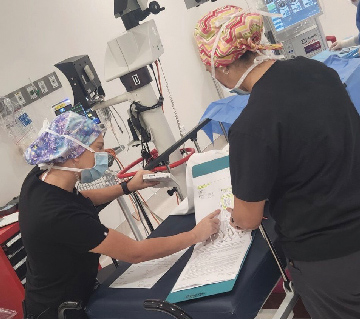Every three months staff at CHRISTUS Spohn Alice (Texas) Hospital are surveyed on a variety of topics. One of the recurring questions in each survey is: “How safe do you feel?” It’s an open-ended question that gives staff the
opportunity to not only voice any concerns they may have, and also to offer their suggestions on how those concerning situations can be remedied. “Leadership is open to any suggestions from associates based on the surveys,” says
Norma C. Escobar, BSN, CNOR, RNFA, director of surgical services at CHRISTUS. “We empower a culture of safety every single day — there is never a time when we’re complacent.”
• Increased security. After the massacre at Robb Elementary School in Uvalde, which is located about three hours from the hospital, CHRISTUS decided to bolster its security and active-attacker training. In addition to arming its security
personal with handguns, the facility limited the public entrances during nights and weekends, added an associate-only entrance keypad and created coded-entry for specific departments such as perioperative services. “We also brought outside
law enforcement agencies in to hold a three-hour educational course on active attacker emergencies,” says Ms. Escobar. The facility also hosted a realistic active attacker drill where their security manager donned a red T-shirt, signaling
that he was the active attacker and playing out various potential scenarios. “It was intense, but we wanted staff to be prepared,” says Ms. Escobar.
• Sharps safety. Years ago, Ms. Escobar was the victim of a needlestick while working on a case involving an HIV-positive patient. “It was terrifying on a personal level, but it also inspired me to make sure something like that
never happened to anyone on my team,” she says.
CHRISTUS made sharps safety a top priority and implemented precautionary measures such as a no sharps zone, where sharps are placed safely on a magnetic pad that prevents inadvertent hand-to-hand passing, and the use of safety needles in the OR.
The dedication to sharps safety has paid off. “I was recently talking to our occupational health nurse about the last time we had a sharps injury, and she couldn’t think of a single incident,” says Ms. Escobar.
• Smoke evacuation. CHRISTUS understands the dangers harmful smoke plume in the operating room, and that’s why its electrocautery units are fully equipped with evacuators that must be used during smoke-generating cases.
Ms. Escobar credits the success of her facility’s employee safety initiatives to a true partnership between leadership and the frontline safe. “To keep your staff safe, you need to have full transparency from administration,”
she says, adding that, for their part, leaders must also be willing to implement the protocols staff truly believe will make them safer. After all, who knows more about the day-to-day safety risks in surgery than the staff on the front lines?
— Jared Bilski
.svg?sfvrsn=be606e78_3)

.svg?sfvrsn=56b2f850_5)